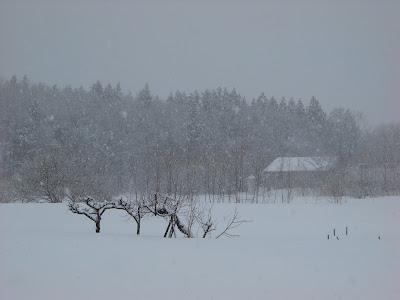Snow Country, Yasunari Kawabata
Vintage International, 192 pgs., 1947, translated by Edward G. Seidensticker in 1957You want to hear about snow country? Let me tell you about snow country. You know, in case you were wondering whether I was qualified to review a book about wasted effort and lots and lots of snow:
(all taken from the front of my house)
Now that that's out of the way, Snow Country. I'll be honest; I didn't like it. This was the book club book for January, and I also know a few other people around here who have read it in English, and all of us have the same opinion: something was definitely lost in translation. It's about the relationship between a geisha and a visiting Tokyo urbanite in Niigata Prefecture in the 1930s, and it was one of three novels for which Kawabata won the Nobel Prize, which I think is the reason none of us have just dismissed it outright. Not only is it critically acclaimed, it's also about the little corner of the world that we've chosen to call home. We want so badly to be proud of it, like we are of our sake and our rice and our Kenshin, but I just couldn't make myself like it. There are some beautiful images contained within it, but the story left me cold.
(See what I did there?)
In his Nobel Prize acceptance speech, Kawabata says this:
Yet in the sad, austere, autumnal qualities so valued by the tea ceremony, itself summarized in the expression "gently respectful, cleanly quiet", there lies concealed a great richness of spirit; and the tea room, so rigidly confined and simple, contains boundless space and unlimited elegance.Kawabata's writing was heavily influenced by haiku poetry, which I think also shares the qualities which he here associates with tea ceremony--wabi-sabi, mono no aware, all those Japanese cultural ideals that have to do with transience and imperfection. I haven't spent much time reading or learning about haiku, but when I have read them (and other forms of Japanese poetry like the waka of the Kokinshu--all in translation, of course), I've generally found them to be pretty accessible, and I'm totally down with the idea of wabi-sabi.
Yet I still couldn't get into this. I think when it comes down to it, I just didn't find the characters compelling enough to invest the time and energy into exploring the book's relationship to haiku, which seems to be its main redeeming factor. The chronology of events was difficult to follow. I don't know a whole lot about geisha culture, which I'm sure impeded my understanding of the book. It was originally published in serial form, and parts of it were written much later than others, which gave it a choppy, non-continuous feel.
I have a hard time accepting cultural relativism in literature. A lot of people who read Snow Country in English seem to explain its impermeability by saying that it's just "too Japanese" to be accessible to the Western reader, but I hate that, and not just because it reeks of orientalism--I want to believe that if it's art, that it will resonate with the human experience no matter who you are or what time and place you come from. Maybe that's silly--I haven't read a whole lot outside of the Western tradition, and I don't have the energy or the desire to really spend a lot of time trying to find redeeming qualities in books that don't speak to me when there is so much else out there to read, so I may never find out whether it's a cultural divide or my own laziness that's the cause. I can say that I found The Sailor Who Fell from Grace with the Sea much more compelling, even though I didn't like its characters, either; the writing was much more consistent and I found the story absorbing in spite of myself.
Anyway, womp womp, can't like them all. I finished this quite some time ago and I've actually finished two other books since then, so those entries are coming up, I promise!
Next up: Guns, Germs, and Steel by Jared Diamond





No comments:
Post a Comment